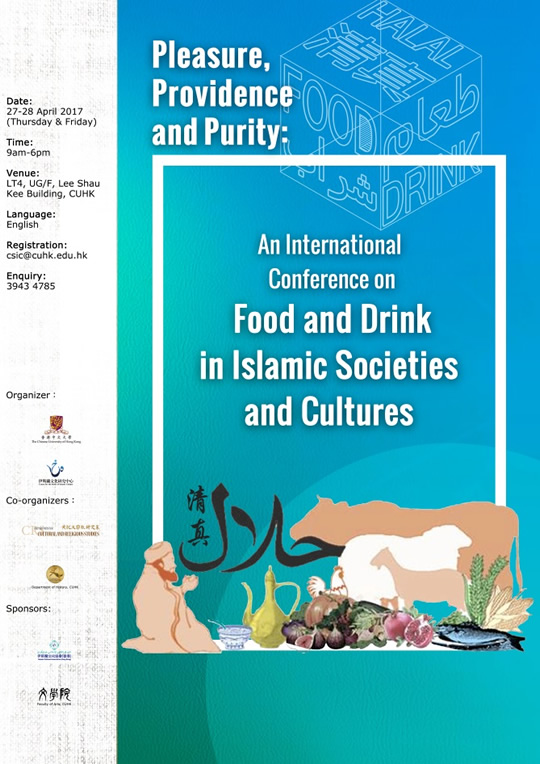>> About Us
In order to promote the discipline in Hong Kong, the Research Institute for the Humanities (RIH) of The Chinese University of Hong Kong (CUHK) came to an agreement with the Islamic Cultural Association (Hong Kong) on 31 July 2013. With sponsorship provided by the latter under the agreement, RIH launched the ‘Islamic Studies Initiative’ (ISI) on 13 September 2013. On 12 May 2015, ISI was approved by the management of the university to become the Centre for the Study of Islamic Culture (CSIC).
>> Contact us
(852) 3943-9580
(852) 3943-4785
LG13I, Leung Kau Kui Building, The Chinese University of Hong Kong, Shatin, New Territories, Hong Kong
Pleasure, Providence and Purity: An International Conference on Food and Drink in Islamic Societies and Cultures
Release time:2017-6-11 11:30:56
Dates: 27-28 April 2017 (Fri & Sat)
Venue: LT 4, Lee ShauKee Building, CUHK
Organizer: Centre for the Study of Islamic Culture, CUHK
Co-organizers: Department of Cultural and Religious Studies, CUHK
Department of History, CUHK
Sponsors: Islamic Cultural Association (Hong Kong)
Faculty of Arts, CUHK
Conference Program(Download)Pdf
The conference aims to examine the complexity and diversity of attitudes and practices related to food and drink among Muslims in various parts of the Islamic world and beyond.
Together with breathing and sleeping, eating and drinking occupy the most basic level of requisites for human physical survival, so basic in fact that it hardly bears mentioning that without food and water we could not exist for long. Thus, the quest for these nutrients is also the most common and fundamental of human preoccupations, which has naturally come to influence, if not dominate, all of our other behaviors. The essential role of food and drink in our life, and the innate knowledge that we subsist by eating and imbibing, have yielded a vast amount of thought on the subject in all societies and cultures. This has included ample consideration not only of what we consume, but also how we approach this most basic behavior. The choice of comestibles has largely been determined by availability within a given environment, but beyond this, humans have also been guided by the axiom, “we are what we eat,” which insinuates a direct correlation between food and drink and both our physical and even metaphysical constitution. Consequently, different human communities have developed a wide range of varying customs, norms and mores concerning what they consider appropriate to consume. The widespread notion that humans “do not live by bread alone” further connects, and also distinguishes, notions of bodily and spiritual sustenance.
Religions have universally interacted with and helped shape social and cultural traditions related to food and drink, including the determination of what may or may not be consumed, and how properly to consume it. No exception to this rule, Islam places considerable emphasis on divine providence of food and drink as a sign of God’s mercy and generosity, on human obligations of gratitude, devotion and charity, and on dietary regulations in connection with injunctions of piety and purity. Islamic dietary orthodoxy and orthopraxy are thus based on fundamental religious principles found in the Qurʿān and teachings of the Prophet Muhammad. These in turn have been the subject of voluminous legal scholarship over the centuries, as Muslim jurists have sought to define what is lawful, ḥalāl, and what is forbidden, ḥarām, in terms of food and drink.
Within this religious legalistic framework, Islamic culinary traditions have been shaped by the transnational movement of Muslims, and their engagement with the societies and cultures that Islam penetrated as it spread from one region to the next. In turn, local cuisines assimilated and were adapted to suit and communicate the basic religious values of Islam, and to represent new forms of Islamic society and culture. In the midst of these religious, social and cultural dynamics, abidance by the Islamic dietary laws and customs, such as the avoidance of pork and alcohol, often functions as one of the most clear and obvious markers of Muslim identity, especially in multicultural contexts. As such, Islamic traditions related to food and drink can help us to track the development of numerous social, political, economic, sectarian and intellectual trends and institutions against the backdrop of tremendous diversity in local histories of Islamic transmission and development, some of which have their roots in pre-Islamic cultures. Many traditional Muslim practices are currently under pressure from the forces of global change, endangering the maintenance of some of them, but also giving rise to innovative social practices and cultural views.
Conference participants will present research from a variety of disciplines, including history, sociology, anthropology, literature, religious studies, and law. The scholarship presented and discussed at the conference will both catalogue and analyse practices and traditions from a range of theoretical and methodological perspectives, to help us document historical processes in the growth of Islamic civilization, understand contemporary developments, and perhaps forecast future changes, within and beyond the global Muslim community.
(Photos)
.jpg)
.jpg)
.jpg)
.jpg)
.jpg)
.jpg)
.jpg)
